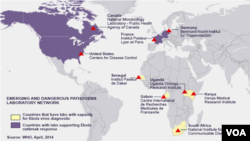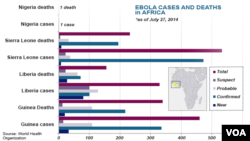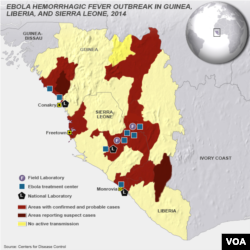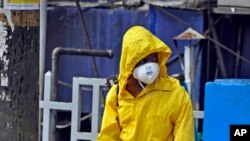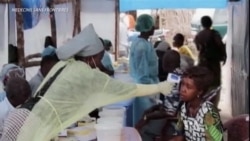The head of the World Health Organization has told the presidents of West African nations stricken by Ebola that the outbreak is moving faster than efforts to control it.
Dr. Margaret Chan, WHO's director general, says if the outbreak continues to worsen, the consequences could be "catastrophic" in terms of lost lives and socio-economic disruption.
Chan is in Conakry, where she met Friday with the presidents of Guinea, Sierra Leone, Liberia and Ivory Coast.
WHO and the West African leaders are finalizing a $100 million plan to fight the spread of Ebola, which has claimed nearly 730 lives. Chan said more than 60 health workers are among the victims, and that some international relief workers have been infected.
The WHO chief said her hope is the plan emerging from the Conakry meeting will mark "a turning point" in the international response to the outbreak.
Several hundred medical personnel are about to be deployed to West Africa, Chan said, and an emergency committee will meet on Wednesday to assess the international implications of the outbreak.
Unprecedented
Referring to the scale of the ongoing Ebola outbreak as unprecedented, WHO spokesman Gregory Hartl told VOA the outbreak is probably worse than the figures indicate.
“There could well be cases in the community that we have missed because this has been one of the biggest challenges in terms of also tracing contacts," Hartl said. "People run away. They do not want to be treated in the health centers. They are afraid or they do not believe that the health centers can do them any good, so they try to be treated by their families and they get sick and die there.”
Hartl says key elements of the emergency plan are to stop transmission of the Ebola virus and to prevent the spread of the disease to neighboring at-risk countries by strengthening and scaling up all control and response measures.
Challenges
He calls this a huge undertaking and says 600 more people are needed in the field to carry it out.
“The biggest challenge of this outbreak has been the fact that there are so many different centers of transmission," Hartl said. "And, at every center of transmission you need a full team of clinical specialists, of infection control specialists, of logisticians, of lab people, of community communicators, of epidemiologists who go out and trace contacts.”
According to Benoit Carpentier, spokesman for the International Red Cross Federation, identifying people infected with Ebola and tracing those who have come in contact with them is a mammoth task.
“If one person that is contaminated gets into contact with 20 other people, then you have got 20 people you need to follow up for 21 days," Carpentier said. "And, if these 20 people get in contact with 20 others-you see how it gets exponential very, very quickly.”
Incubation period
Ebola has an incubation period of between two and 21 days. It is spread through contact with the blood or bodily fluids of an infected person. There is no cure and fatality rates can be as high as 90 percent. But, health officials stress people who seek treatment at a clinic as soon as they fall ill have a better chance of survival.
Initial flu-like symptoms can lead to external hemorrhaging from areas like eyes and gums, and internal bleeding which can lead to organ failure.
Some 2,400 volunteers from the International Red Cross Federation have been working in the three infected countries since the Ebola epidemic started. Carpentier says it is this message of hope that Red Cross volunteers are trying to communicate.
“We have a good example of a person in Guinea that was infected and survived and he is now a Red Cross volunteer and he goes from community to community to actually pass these messages…of hope," he noted.
Slow initial response
West African leaders were initially slow to react to the outbreak. They now are taking extraordinary measures to contain the disease. Liberia has closed its schools, ordered non-essential public servants to stay home from work and closed its borders. Sierra Leone has declared a state of emergency and called in troops to quarantine Ebola victims.
Hartl says it is too soon to know whether these measures will be successful.
“But, certainly, it is very good that these countries are thinking along the lines of the fact that something extraordinary needs to be done…I think what we need to do is look at any and all measures, which are taken in the light of will they help bring the outbreak under control," he said.
On alert
In Nigeria Friday, authorities closed a mortuary in southern Anambra State and quarantined the staff in a new Ebola alert. Health officials suspect a Nigerian man whose body is at the facility died of Ebola after being infected in Liberia.
U.S. health authorities are warning against travel to Guinea, Liberia and Sierra Leone. But, the World Health Organization does not endorse a travel ban.
It also advises against border closures saying they might be helpful, but are not foolproof. The U.N. health agency says the best way to tackle Ebola and to stop the outbreak is to put the necessary measures in place at the source of the infection.
WATCH: Related video report by Mary Alice Salinas




